Related Research Articles

Roberta Joan "Joni" Mitchell is a Canadian-American singer-songwriter and painter. Drawing from folk, pop, rock, classical, and jazz, Mitchell's songs often reflect on social and philosophical ideals as well as her feelings about romance, womanhood, disillusionment and joy. She has received many accolades, including ten Grammy Awards and induction into the Rock and Roll Hall of Fame in 1997. Rolling Stone called her "one of the greatest songwriters ever", and AllMusic has stated, "When the dust settles, Joni Mitchell may stand as the most important and influential female recording artist of the late 20th century".

"You've Got a Friend" is a 1971 song written by Carole King. It was first recorded by King and included in her album Tapestry. Another well-known version is by James Taylor from his album Mud Slide Slim and the Blue Horizon. His was released as a single in 1971, reaching number 1 on the Billboard Hot 100 and number 4 on the UK Singles Chart. The two versions were recorded simultaneously in 1971 with shared musicians.
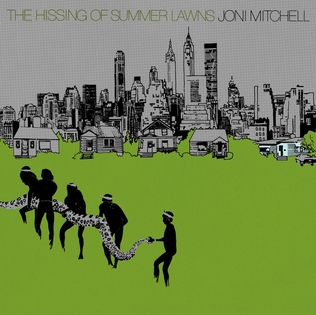
The Hissing of Summer Lawns is the seventh studio album by the Canadian singer-songwriter Joni Mitchell, released in 1975.
"A Case of You" is a song by Joni Mitchell, from her 1971 album Blue.

"Carey" is a song from the 1971 Joni Mitchell album Blue. It was inspired by her time spent with Cary Raditz, living with a cave-dwelling hippie community at Matala, on the Greek island of Crete.
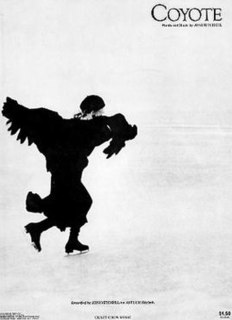
"Coyote" is the opening song from Joni Mitchell's 1976 album Hejira and also the album's first single.
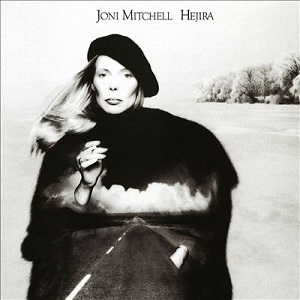
Hejira is the eighth studio album by Canadian singer-songwriter Joni Mitchell. The songs on the album were written during a series of road trips in 1975 and 1976, and reflect events that occurred during those trips, including several romantic relationships she had at the time. Characterized by lyrically dense, sprawling songs, as well as the overdubbed fretless bass playing of Jaco Pastorius, Hejira continued the musician's journey beyond her pop records towards the freer, jazz-inspired music she would implement on later recordings. Some of the songs were written while Mitchell traveled as a member of Bob Dylan's Rolling Thunder Revue tour, and she performed the album tracks "Coyote" and "Furry Sings the Blues" with The Band at their final concert.
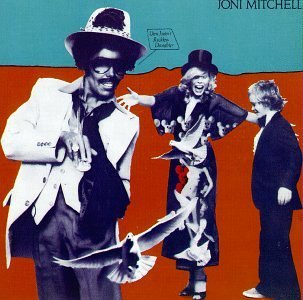
Don Juan's Reckless Daughter is a 1977 double album by Canadian singer-songwriter Joni Mitchell. Her ninth album, it is unusual for its experimental style, expanding even further on the jazz fusion sound of Mitchell's Hejira from the year before. Mitchell has stated that, close to completing her contract with Asylum Records, she allowed this album to be looser than anything she had done previously.
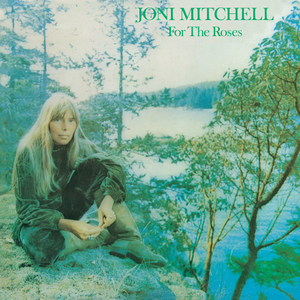
For the Roses is the fifth studio album by Canadian singer-songwriter Joni Mitchell. It was released in November 1972, between her two biggest commercial and critical successes—Blue and Court and Spark. In 2007 it was one of 25 recordings chosen that year by the Library of Congress to be added to the National Recording Registry.
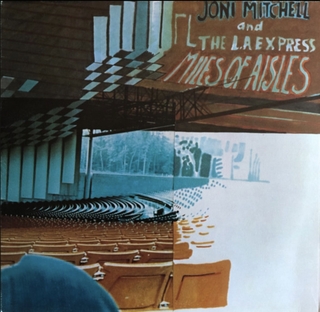
Miles of Aisles is the first live album by Canadian singer-songwriter Joni Mitchell, released in 1974 on Asylum Records. It is a double album documenting her concerts in support of the Court and Spark album with her backing band for the tour, the L.A. Express. It reached No. 2 on the Billboard 200 and became one of her biggest-selling records, certified a gold record by the RIAA.
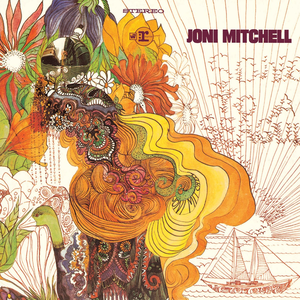
Song to a Seagull is the debut studio album by Canadian singer-songwriter Joni Mitchell. Produced by David Crosby, the album was recorded in 1967 at Sunset Sound and released on March 23, 1968 by Reprise Records.

Clouds is the second album by Canadian singer-songwriter Joni Mitchell, released on May 1, 1969, by Reprise Records. After releasing her debut album, Song to a Seagull (1968), to considerable exposure, Mitchell recorded Clouds at A&M Studios in Hollywood. She produced most of the album and painted a self-portrait for its cover artwork. Clouds has subtle, unconventional harmonies and songs about lovers, among other themes.
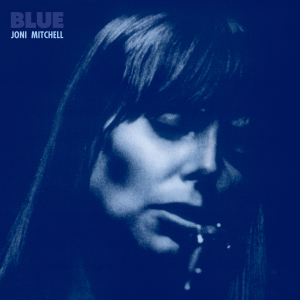
Blue is the fourth studio album by Canadian singer-songwriter Joni Mitchell, released on June 22, 1971, by Reprise Records. Written and produced entirely by Mitchell, it was recorded in 1971 at A&M Studios in Hollywood, California. Created just after her breakup with Graham Nash and during an intense relationship with James Taylor, Blue explores various facets of relationships from infatuation on "A Case of You" to insecurity on "This Flight Tonight". The songs feature simple accompaniments on piano, guitar and Appalachian dulcimer. The album peaked at number 3 on the UK Albums Chart, number 9 on the Canadian RPM Albums Chart and number 15 on the Billboard 200.
"Both Sides, Now" is a song by Canadian singer-songwriter Joni Mitchell. First recorded by Judy Collins, it appeared on the US singles chart during the fall of 1968. The next year it was included on Mitchell's album Clouds, and became one of her best-known songs. It has since been recorded by dozens of artists, including Dion in 1968, Herbie Hancock in 2007, and Mitchell herself who re-recorded the song with an orchestral arrangement on her 2000 album Both Sides Now.
"River" is a song by Canadian singer songwriter Joni Mitchell, from her 1971 album Blue. Written on piano, it has become a standard for artists in many music styles, and has become popular as Christmas music. Although never released as a single, “River” holds second place among Mitchell's songs most recorded by other artists. In 2021, it was ranked at No. 247 on Rolling Stone's "Top 500 Best Songs of All Time".

"You Can Close Your Eyes" is a song written by James Taylor which was released on his 1971 album Mud Slide Slim and the Blue Horizon. It was also released as the B-side to his #1 single "You've Got a Friend". It has often been described as a lullaby. It was initially recorded by his sister Kate Taylor for her 1971 album Sister Kate. The song has been covered by many artists, including Carly Simon, Linda Ronstadt, Maureen McGovern, Richie Havens, Sheryl Crow, Sting, Eddie Vedder with Natalie Maines, and the King's Singers.
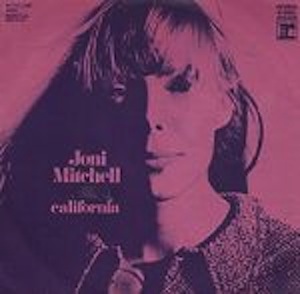
"California" is a song written by Joni Mitchell that first appeared on her 1971 album Blue. It was also released as the second single from the album, as a follow-up to "Carey".
"The Circle Game" is a song by Canadian singer-songwriter Joni Mitchell composed in 1966. One of her most-covered songs, it was originally recorded by Ian & Sylvia and Buffy Sainte-Marie in 1967, and by Tom Rush for his 1968 album of the same name. Mitchell recorded it for her 1970 album Ladies of the Canyon, it also appears on her album Miles of Aisles.

The Joni Mitchell Archives is an ongoing project to release previously unreleased recorded material by Canadian singer-songwriter Joni Mitchell. So far, each new release schedule consists of a box set collection, a compilation with material on the box set release, and a live album. The project is being overseen by Mitchell and Patrick Milligan, director of A&R for Rhino Records, the label through which the project's offerings are being released. The first release also received input from Neil Young, who had experience with the release of his own extensive archival series, and Mitchell and Young's late manager Elliot Roberts, who died during the process of planning the first box set, and to whom the release is dedicated.

The Reprise Albums (1968–1971) is a four-disc box set by Canadian singer-songwriter Joni Mitchell, that was released on June 25, 2021, by Rhino Records. The set is the sixth overall release and first box set of remastered albums from the Joni Mitchell Archives, a planned series of releases featuring remastered and unreleased material from the singer's archives. Formatted in chronological order, the first volume of the remaster series includes Mitchell's first four albums, all of which were released on Reprise Records: Song to a Seagull (1968), Clouds (1969), Ladies of the Canyon (1970), and Blue (1971).
References
- ↑ Dan Chiasson (October 2, 2017). "Joni Mitchell's Openhearted Heroism". The New Yorker .
- ↑ Higgins, Bill (April 8, 1997). "Both sides at last". Los Angeles Times . Retrieved November 27, 2011.
- ↑ Pertman, Adam (March 16, 2011). Adoption Nation: How the Adoption Revolution is Transforming Our Families -- and America . Harvard Common Press. pp. 289–. ISBN 978-1-55832-716-0 . Retrieved November 27, 2011.
- ↑ Dale Eisler. "Joni Mitchell's Secret". The Canadian Encyclopedia. Retrieved July 4, 2015.
- ↑ Posner, Michael (April 11, 1998). "Little Green a Little Blue". Toronto Globe and Mail. Retrieved November 27, 2011.
- ↑ Purvis, Andrew (April 21, 1997), "Joni, No Longer Blue", Time Magazine , retrieved June 29, 2021
- ↑ "Joni Mitchell - Little Green - transcription". jonimitchell.com. Retrieved 2019-07-12.
- ↑ Crouse, Timothy (1971-08-05). "Joni Mitchell Blue Album Review". Rolling Stone. Retrieved July 4, 2015.
- ↑ Hamilton, Jack (2013-02-14). "Why Joni Mitchell's 'Blue' Is the Greatest Relationship Album Ever". The Atlantic. Retrieved 2019-07-12.
- ↑ "Episode 43: Colors". Theme Time Radio Hour Archive. Retrieved 2021-04-10.